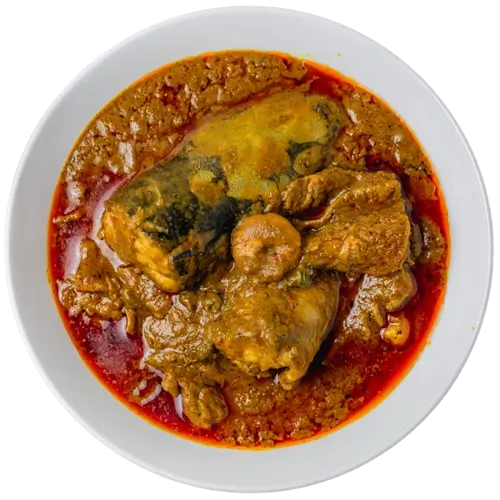Ofe Akwu, also known as palm fruit soup, is a delicious and nutritious Nigerian soup famous in the eastern and southern parts of the country. It is made from the extract of palm fruits, which are boiled, pounded, and sieved to obtain a thick, creamy liquid. Ofe Akwu is usually cooked with meat, fish, spices, and herbs and served with boiled rice, yam, or any choice of swallow.
This soup is the Igbo version of Banga Soup, made by the Urobo and itshekiri people of Delta State and some south-south people. The soup is highly nutritious and very similar; the only difference may be the mode of preparation and the ingredients used.
This article will explore the history, origin, nutritional value, health benefits, ingredients, preparation, and consumption of this mouth-watering soup. If you’re ready, let’s dive in!
History and Origin of Ofe Akwu
The Igbo people of southeastern Nigeria have been enjoying Ofe Akwu, a traditional soup, for centuries. Their cuisine reflects their rich and diverse culture, with palm fruits being a staple ingredient in their region. Palm fruits are abundant and used to make palm oil, which is widely used in Nigerian cooking.
Banga soup, another famous palm fruit soup, is similar to Ofe Akwu but differs in the spices and herbs used and the accompaniments. Ofe Akwu is seasoned with ogiri okpei (locust bean), uziza (piper guineense), and scent leaf (Ocimum gratissimum).
On the other hand, Banga soup is seasoned with atama (Heinsia crinita), irugeje (Tetrapleura tetraptera), and oburunbebe (Pseudocedrela kotschyi). Ofe Akwu is typically enjoyed with rice or yam, while Banga soup is eaten with starch (a cassava-based swallow) or eba (garri).
Nutritional Value of Ofe Akwu
Ofe Akwu is a highly nutritious soup with a balanced diet of carbohydrates, proteins, fats, vitamins, minerals, and antioxidants. The palm fruit extract is rich in beta-carotene (vitamin A), essential for vision, immunity, and skin health. It also contains vitamin E, which protects the cells from oxidative stress and inflammation. Palm fruit extract is also a good source of healthy fats, especially oleic acid (omega-9), which helps lower cholesterol levels and improve heart health.
The meat and fish used in Ofe Akwu provide high-quality protein vital for muscle growth and repair. They also supply iron, zinc, selenium, and vitamin B12, essential for blood formation, immune function, thyroid function, and nerve function.
The spices and herbs used in Ofe Akwu add flavour and aroma to the soup, and phytochemicals have anti-inflammatory, antibacterial, antifungal, antiparasitic, and anticancer properties. These spices and herbs include crayfish, pepper, ogiri okpei, uziza, and scent leaf.
Here is a summary of the nutritional value of Ofe Akwu per serving:
- Calories: 450
- Protein: 40 grams
- Fat: 36 grams
- Carbohydrates: 13 grams
- Dietary fibre: 0 grams
- Sugars: 0 grams
- Sodium: 189 milligrams
- Potassium: 467 milligrams
- Cholesterol: 0 milligrams
Percentages are based on a diet of 2000 calories a day.
It is important to note that this nutritional information is based on a single serving of Ofe Akwu. The actual nutritional value of your soup may vary depending on the ingredients you use and the amount you eat.
Health Benefits of Ofe Akwu
The soup or stew has several health benefits, making it a beneficial addition to any diet. Some of these benefits include:
- Improving eye health: The beta-carotene in palm fruit extract helps prevent night blindness and age-related macular degeneration. It also protects the eyes from infections and injuries.
- Boosting immunity: The vitamins A and E in palm fruit extract help strengthen the immune system and fight off infections. The protein in meat and fish also helps produce antibodies against pathogens.
- Lowering blood pressure: The oleic acid in palm fruit extract helps reduce blood pressure by relaxing the blood vessels and improving blood flow. The potassium in meat and fish also helps regulate blood pressure by balancing the sodium levels in the body.
- Preventing anaemia: The iron in meat and fish helps prevent anaemia by increasing the production of red blood cells that carry oxygen to the tissues. The vitamin C in pepper also helps enhance iron absorption from plant sources.
- Enhancing digestion: The fibre in palm fruit extract helps promote bowel movement and prevent constipation. The ogiri okpei also helps improve digestion by providing probiotics that balance the gut flora.
- Protecting against cancer: The antioxidants in palm fruit extract help protect the cells from free radical damage that can cause mutations and cancer. The phytochemicals in spices and herbs also help inhibit the growth and spread of cancer cells.
List of Ingredients for Ofe Akwu
To make a delicious pot of Ofe Akwu for about six people, you will need the following ingredients:
- Assorted meat (beef, goat meat, cow skin)
- Catfish or dried fish
- Fresh or dried prawns
- Palm fruit extract (Akwu or Banga)
- Ground crayfish
- Seasoning cubes
- Salt to taste
- Pepper
- Ogiri okpei (optional)
- Uziza seeds
- Chopped scent leaf (optional)
How to Cook/Prepare Ofe Akwu
To cook the soup or stew, follow these simple steps:
- Wash and season the meat with salt, pepper, and one seasoning cube. Boil until it’s tender and set it aside.
- Wash and cut the catfish or dried fish into pieces. If you’re using dried fish, soak it in hot water for a few minutes to soften and remove the bones.
- Wash and shell the prawns. If you’re using dried prawns, soak them in hot water for a few minutes to rehydrate.
- If you’re using fresh palm fruits, boil them until soft and pound them in a mortar to extract the juice. Sieve the juice and throw away the chaff.
- Blend the crayfish, pepper, ogiri okpei, and uziza seeds together.
- In another pot, boil the banga or palm fruit extract. Add the blended paste and stir well. Add salt and the remaining seasoning cube to taste.
- Add the meat, fish, and prawns to the soup and simmer for about 15 minutes or until the soup is well-cooked and thickened.
- Add the chopped scent leaf and stir well. Turn off the heat and serve hot with akpu or garri.
How to Enjoy/Eat Ofe Akwu
Ofe Akwu is best enjoyed with boiled rice, yam, or any swallow of your choice. Some popular swallows that go well with Ofe Akwu are pounded yam, eba, semolina, amala, or fufu.
Side Effects of Ofe Akwu
Ofe Akwu is safe and healthy to eat, but some people may experience side effects due to allergies or intolerances to some ingredients. Some of these side effects include:
- Stomach upset: Some people may have stomach upset or diarrhoea after eating Ofe Akwu due to the high-fat content of palm fruit extract or the spicy nature of the soup. To prevent this, eat Ofe Akwu in moderation and drink plenty of water.
- Allergic reactions: Some people may be allergic to some of the ingredients in Ofe Akwu, such as crayfish, prawns, fish, or ogiri okpei. These reactions may include itching, swelling, rashes, hives, or difficulty breathing. To prevent this, avoid eating Ofe Akwu if you are allergic to any of the ingredients, or consult your doctor before eating it.
- High blood pressure: Some people may have high blood pressure after eating Ofe Akwu due to the high sodium content of seasoning cubes or salt. To prevent this, reduce the amount of seasoning cubes or salt you use when cooking Ofe Akwu or use low-sodium alternatives.
How to Thicken Ofe Akwu
Ofe Akwu is usually thickened by the starch content of palm fruit extract or by adding pounded yam to the soup. However, if your Ofe Akwu is too watery or thin for your liking, you can thicken it by using any of the following methods:
- Add more palm fruit extract: If you have more palm fruit extract, add it to the soup and boil it until it thickens. This will also enhance the flavour and colour of the soup.
- Add cornstarch: While stirring, you can dissolve some cornstarch or flour in water and add it to the soup. This will help thicken the soup without changing the taste. However, add only a little; if not, the soup may have lumps or lose flavour if its added in excess.
Difference Between Ofe Akwu and Banga Soup
Ofe Akwu and Banga soup are both palm fruit soups popular in Nigeria, but some differences distinguish them from each other. Some of these differences are:
- The Igbo people of southeastern Nigeria mainly eat Ofe Akwu, while the people of the Niger Delta region of southern Nigeria eat Banga soup.
- Ofe Akwu is seasoned with ogiri okpei, uziza, and scent leaf, while Banga soup is seasoned with atama, irugeje, and oburunbebe. These spices and herbs give each soup a unique flavour and aroma.
- Ofe Akwu is sometimes eaten with rice or yam, while Banga soup is mostly eaten with starch or eba.
Can a Pregnant Woman Eat Ofe Akwu
Ofe Akwu is generally safe and healthy for pregnant women, providing essential nutrients such as vitamin A, iron, protein, and healthy fats that benefit the mother and the baby. However, pregnant women should eat Ofe Akwu in moderation and avoid overeating it, as it may cause side effects such as stomach upset, high blood pressure, or allergic reactions.
Pregnant women should also ensure that the ingredients used to make Ofe Akwu are fresh and hygienic and that the soup is well-cooked and stored properly.
Ofe Akwu Tribe
Ofe Akwu is a traditional soup that belongs to the Igbo tribe of southeastern Nigeria. The Igbo tribe is one of the largest and most influential ethnic groups in Nigeria, with a population of about 40 million people.
The Igbo tribe is known for its rich and diverse culture, which includes its language, religion, art, music, dance, cuisine, clothing, festivals, and ceremonies. The Igbo tribe has a strong sense of identity and pride in its heritage and history.
Ofe Akwu Shelf Life
Ofe Akwu can last about two to three days if stored properly in the refrigerator or freezer. To store Ofe Akwu in the fridge, transfer it to an airtight container and keep it in the coldest part of the fridge. To use or eat again, remove it from the refrigerator and keep it overnight to melt if blocked, or microwave it.
Frequently Asked Questions
What Is the Difference Between Banga Soup and Ofe Akwu?
Banga soup and Ofe Akwu are both palm fruit soups that are popular in Nigeria, but they have some differences in terms of the spices or ingredients. Ofe akwu is also used to eat rice as it can serve as a stew, but Banga is used for swallows mostly.
What Is the English Name of Ofe Akwu?
Ofe Akwu is known in English as Palm fruit soup or palm nut soup.
What is Ofe Akwu Made of?
Ofe Akwu is made from palm fruit extract obtained by boiling, pounding, and sieving palm fruits. It is also cooked with meat, fish, spices, and uziza or scent leaves.
Why is Ofe Akwu Similar to Banga soup?
Ofe Akwu is similar to Banga soup because they use palm fruit extract as the main ingredient. They also have a similar appearance but may have different flavours because of the ingredients used.
Conclusion
Ofe Akwu is a popular and delicious palm fruit soup found in Nigeria’s eastern and southern regions. It is prepared by boiling, pounding, and straining the extract from palm fruits to obtain a thick, creamy liquid. This soup is usually cooked with spices, fish, or meat and is served with boiled rice, yam, or swallow.
This soup has a rich history and originates from the Igbo tribe and Delta State in southeastern Nigeria. It is also highly nutritious and offers numerous health benefits. Ofe Akwu can be enjoyed differently, depending on personal taste and preference. Although it is generally safe and healthy to consume, some individuals may experience side effects due to allergies or intolerances to certain ingredients.
Try this soup today with its nutritional and health benefits, and you won’t regret it!





